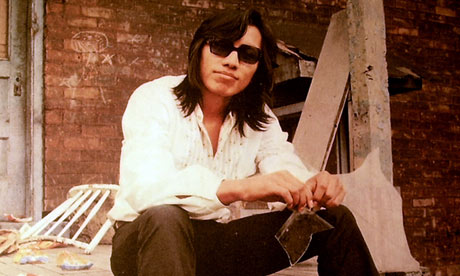
It's a few minutes before 8pm. Outside the Highline Ballroom in Chelsea, in lower Manhattan, scores of people are queuing in a desperate hope they'll be able to get their hands on tickets for the gig taking place there tonight. Doors opened at 6, and the limited number of on-the-night tickets were snapped up instantly by those at the front of the queue. Two hours later, fans are still hanging around, asking, hoping for spares. That fervour is significant, as is the fact that Sixto Rodriguez, the headline act, has sold out the venue.
Forty-two years ago, when the Detroit-born musician released his debut album, Cold Fact, that wouldn't have happened. It probably wouldn't have occurred four months ago. But since the July release of Searching for Sugar Man, Swedish director Malik Bendjelloul's heartwarming documentary about the singer, Rodriguez's profile has risen dramatically in the US. Before, he was regarded with indifference in his home country. Now, the 70-year-old receives a hero's welcome that visibly overwhelms him as he shuffles on stage, arm in arm with an aide who leads him to the microphone.
Reading this on mobile? Click here to view
Rodriguez's was a career that, for some reason, never really took off. His songs have a Dylanesque edge: folky and occasionally psychedelic tunes underpinned by an astute lyrical acuity, protest songs that combine social commentary and critique with emotive tales of loss and love, as well as colourful depictions of the characters treading Detroit's cracked streets. Unlike Dylan's, however, they didn't sell. In 1975, Rodriguez was dropped by his label, and subsequently disappeared from the radar. He spent the ensuing decades just getting on with life, working odd jobs as a manual labourer and construction worker in his hometown. He even ran, unsuccessfully, for mayor.
Unbeknownst to him, however, through a smuggled bootleg cassette of Cold Fact, he had become a star in South Africa, his socially conscientious songs providing relief and optimism to a youth oppressed by apartheid. Naturally, under such a regime cold facts were hard to come by, and rumours spread that the singer was dead. One theory, in fact, was that he had blown his brains out on stage after a particularly badly received gig. He hadn't, of course. When the films' protagonists, Stephen Segerman and Craig Bartholomew Strydom, two South African fans, discovered this, they endeavoured to bring Rodriguez to their country. They succeeded, and in 1998 he played the first of many sold-out tours there, performing to thousands of people who'd waited more than two decades to see him live.
Some 14 years later, he has not quite reached that level of success yet in the States, but he's certainly making inroads. Clad head to toe in black, he plays tonight in front of 700 people, who treat him with unfaltering reverence. He's shy and shaky, uncertain and unsteady – far from a slick, polished performer. But that doesn't matter. As he warms up, the likes of I Wonder, Forget It, Crucify Your Mind and that staple song about a Detroit drug dealer, Sugar Man ("It's a descriptive song, not a prescriptive song," he jokes), sound like the lost classics they are.
Reading this on mobile? Click here to view
But it's not just the songs that inspire this jaw-dropped, so-silent-you-could-hear-a-pin-drop crowd. Nor is it just his remarkable triumph over adversity. Certainly, those things play their part, but it's Rodriguez's modesty and unaffected honesty that truly mark him out. As one fan shouts out mid-set, "You're the real thing!" Another declares after the show: "He's the truth. Rodriguez is the truth!" On this hot night in Manhattan, in a country beginning to buckle under the weight of pre-election tension – not to mention an increasingly aggressive and negative political landscape in which unconcealed avarice, deep-rooted corruption and insidious misinformation are somehow able to prosper – that's a scarce, but utterly welcome, commodity. Rodriguez has, perhaps, never really needed America, but it would seem that America certainly needs him. And as they say, better late than never.
• Sixto Rodriguez tours the UK in November

